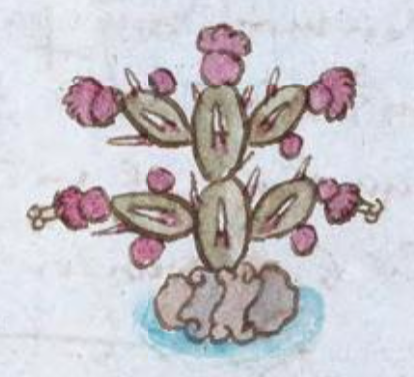Tenochtitlan (Osu8v)
This compound glyph for the place name, Tenochtitlan (“On the Cactus of the Stone”), shows a prickly pear cactus (nochtli) on a stone (tetl), and the stone is surrounded by a small amount of turquoise-blue water. The cactus is green and segmented, with long sharp red-and-white thorns. The cactus has perhaps five red flowers and five red fruits. The blue water is semantic and not otherwise read as part of the name. The locative suffix (-titlan), next to, is not shown visually.
Stephanie Wood
This glyph is emblematic, surviving in a modified form still today on the Mexican flag. The blue water is a reminder that Mexico City was founded in the middle of lakes.
Stephanie Wood
1551–1565
Jeff Haskett-Wood
ciudades, altepetl, nopales, piedras, lagos, nombres de lugares

Tenochtitlan, Mexico City, “On the Cactus of the Stone,” https://nahuatl.wired-humanities.org/content/tenochtitlan
te(tl), stone, https://nahuatl.wired-humanities.org/content/tetl
noch(tli), prickly pear cactus, https://nahuatl.wired-humanities.org/content/nochtli
-titlan (locative suffix), next to, https://nahuatl.wired-humanities.org/content/titlan
Mexico-Tenochtitlan
Stephanie Wood
Library of Congress Online Catalog and the World Digital Library, Osuna Codex, or Painting of the Governor, Mayors, and Rulers of Mexico (Pintura del Gobernador, Alcaldes y Regidores de México), https://www.loc.gov/resource/gdcwdl.wdl_07324/. The original is located in the Biblioteca Nacional de España.
"The Library of Congress is unaware of any copyright or other restrictions in the World Digital Library Collection. Absent any such restrictions, these materials are free to use and reuse." But please cite the Biblioteca Nacional de España and this Visual Lexicon of Aztec Hieroglyphs if you use any of these images here or refer to the content on this page, providing the URL.









